Resources
The following resources have been collected to assist faculty, administrators, students, and staff in their efforts to foster, promote, and sustain an inclusive and diverse campus climate at Sonoma State. Content includes resources related to student success; pedagogy and classroom equity; and policies related to diversity, equity, campus climate, and inclusion. If you are looking for resources related to anti-racism, please visit our anti-racism resources page. To offer suggestions for additional resources to be included on this page please email diversity@sonoma.edu
Review Key Terminology and Concepts
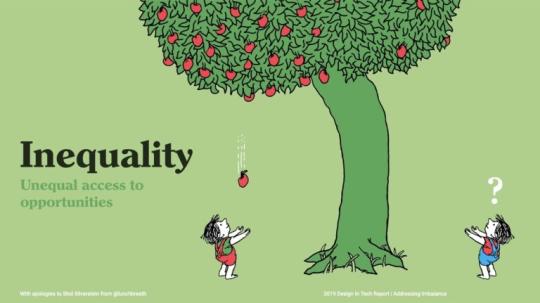
Inequality: Unequal access to opportunities
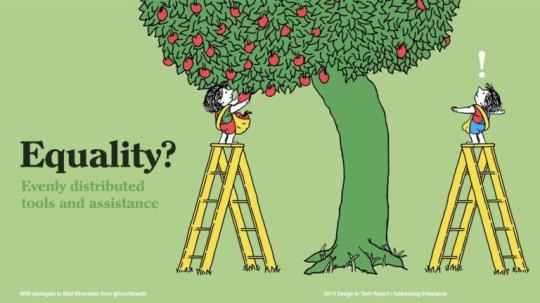
Equality: Evenly distributed tools and assistance
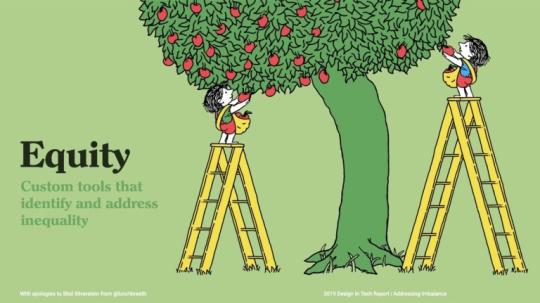
Equity: Custom tools that identify and address inequality
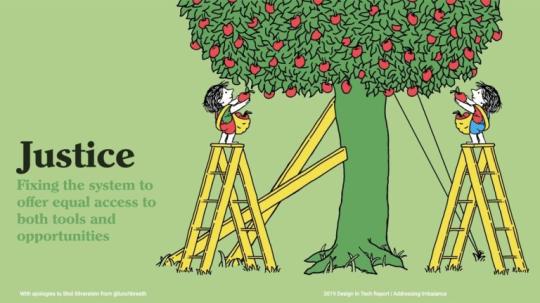
Justice: Fixing the system to offer equal access to both tools and opportunities
Publications
During the 2016-17 school year, the California State University Chancellor’s Office distributed AHEAD surveys to four stakeholder groups on all CSU campuses to get feedback on the utility, quality, and effectiveness of services on campus to support students with disabilities.
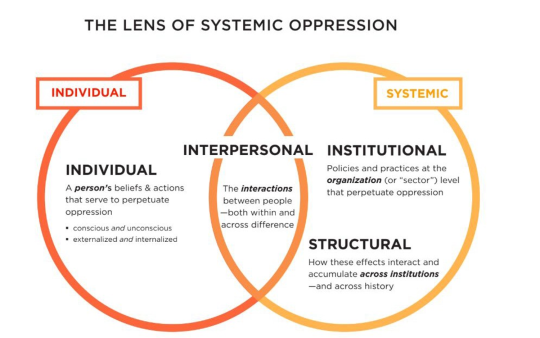
Long Description for the Lens of Systemic Oppression
- Bensimon, E.M., Dowd, A.C., Stanton-Salazar, R., & Dávila, B.A. (2019). The Role of Institutional Agents in Providing Institutional Support to Latinx Students in STEM. The Review of Higher Education 42(4), 1689-1721
- Bensimon, E.M., Gray. J. (2020). First-Generation Equity Practitioners: Are They Part of the Problem?, Change: The Magazine of Higher Learning, 52:2, 69-73
- Broadwater, L. (2019). Hopkins president pitches Maryland lawmakers on need for police force; students, community advocates push back. The Baltimore Sun.
- California State University. (2019). Redefining historically underserved students in the CSU: Moving beyond race and economic status to close equity gaps.
Our research has shown that all of these variables [first generation status; economic and financial challenges; college readiness; coming from underserved communities] are related to student success and that considering some or all of them in combination can increase the accuracy in our understanding of which students may need additional support to help them on their way to degree completion. A student does not need to have all of these characteristics to be considered historically underserved. In fact, it is possible that a student possessing only one may need assistance during their college career. Our goal is to better understand the complexity of our students and more importantly, identify and provide the support that they need to be successful.
- Could disability be further included in diversity efforts?, Inside Higher Ed; November 12, 2020
Colleges and universities are making progress on efforts to serve disabled students, but some advocates and scholars say higher ed has been slow to recognize disability as an identity group or include it in programming around diversity and inclusion.
Dizon, J.P. Holcombe, E., Kezar, A. (2021) Shared Equity Leadership: Making Equity Everyone's Work
The work of improving equity outcomes of students of color is at its most effective when leadership teams across campus take collective responsibility in developing and moving the diversity, equity, and inclusion agenda forward, according to a new research paper authored by the American Council for Education (ACE) and the Pullias Center for Higher Education.
- Embrick, D. G. (2015). Two nations, revisited: The lynching of black and brown bodies, police brutality, and racial control in ‘post-racial’Amerikkka. Critical Sociology, 41(6), 835-843.
- Espinosa, L., Turk, J., & Taylor, M. (2017). Pulling back the curtain: Enrollment and outcomes at minority serving institutions. ACE Center for Policy Research and Strategy (CPRS).
The analysis presented in this report utilizes data from the National Student Clearinghouse —the largest and most comprehensive source of postsecondary enrollment nationwide—to examine how students who started college in 2007 at an MSI move through higher education. The first study to utilize NSC data to examine enrollment and outcome trends at MSIs, this report aims to paint a more complete picture of the contributions of MSIs to the communities they serve.

Long Description For "I Don't See Color"
In a nationally representative sample, first-year U.S. college students “somewhat agree,” on average, that they feel like they belong at their school. However, belonging varies by key institutional and student characteristics; of note, racial-ethnic minority and first-generation students report lower belonging than peers at 4-year schools, while the opposite is true at 2-year schools. Further, at 4-year schools, belonging predicts better persistence, engagement, and mental health even after extensive covariate adjustment. Although descriptive, these patterns highlight the need to better measure and understand belonging and related psychological factors that may promote college students’ success and well-being.
Learn research-based strategies to promote positive dialogue and understanding.
In this report we . . . provide arguments for why race-conscious policies that are designed to eliminate racism are necessary. We share data that explains why a focus on income alone may not close gaps in opportunity and outcomes for students of color, particularly Black students and families. And we offer strategies on how leaders and policymakers can design and implement race-conscious policies in higher education.
I examine how and why the social construction of Asian Americans has changed from coolie to model minority over the last century. I examine the role of the U.S. government in creating policies that systematically select particular types of entrants to the United States. Federal immigration policy privileges high-skilled workers, and a disproportionately large number of Asian immigrants are granted the status of lawful permanent resident by the federal government on the basis of employment preferences.
The purpose of this guide is to help people of all gender identities and experiences practice more care toward those on the margins. Trans people must be understood as the authorities on ourselves and the language used to describe us. Not only does this mean that cisgender (non-trans) people need to practice humility and care toward trans people, but it also means that trans people—particularly those with educational, financial, and/or racial privilege—need to practice humility and care toward other trans people—particularly those who are folks of color, low-income, less educated, and/or elders.
The diverse student success infrastructure is by design intentional—leveraging nine distinct but necessarily interrelated functions and features of institutional operations. Some reflect campus units, like human resources and finance, while others represent administrative approaches, like governance and incentive structures. Together they comprise the toolbox for intentional leadership on supporting diverse students (as well as diverse faculty and staff).
Various factors have been identified by previous studies as predictive of citizens’ attitudes toward the police, but there has not been as much effort to establish whether higher educational attainment has any effect on the gap between the various population groups that typically differ in their perception of the police. This study tests for the effect of race and other factors on the attitude of college students toward the police.
This guidance document has been prepared to assist campus decision makers, faculty, administrators, students and staff on providing supportive positive and inclusive campus climates during the COVID-19 crisis.
Timeline dating from the 17th century highlighting trends in public education that have shaped existing dynamics and inequities.
- Ready to Be an Ally for Black Academics? Here's a Start, The Chronicle of Higher Education; November 11, 2020
Twelve ways that white faculty members can better support Black academics in their department and across the campus.
In the last decade, LGBTQ people in the United States—particularly in K-12 and higher education—have gained increasing visibility and some civil rights, including open service in the U.S. military, marriage equality, and some state- or local-level protection against bullying and hate crimes. Yet problems remain. . .Of the many important concerns higher education leaders need to be aware of regarding LGBTQ students, three core issues are 1) identity development, 2) campus climate, and 3) state and national social and policy contexts.
- Salinas, C. (2020) The Complexity of the “x” in Latinx: How Latinx/a/o Students Relate to, Identify With, and Understand the Term Latinx. Journal of Hispanic Higher Education
- Salinas, C. & Lozano, A. (2021). History and Evolution of the term Latinx. In E. G. Murillo, D. Delgado Bernal, S. Morales, L. Urrieta, E. Ruiz Bybee, J. Sánchez Muñoz, V. B. Saenz, D. Villanueva, M. Machado-Casas, & K. Espinoza (Eds.), Handbook of Latinos and Education (second edition), (pp. 249-263). Rutledge
- Sabbagh. A. H. (2019) Globalizing Local Resistance from Palestine to Ferguson: Transnational Alliances and Activist Scholarship.
- Schwartz, J. (2012). A new normal: Young men of color, trauma and engagement in learning. Adult Education Research Conference Proceedings.
This phenomenological study examined trauma experienced by young men of color, traumas effect on engagement in college, and the young men’s willingness to access counseling. The theoretical and methodological frameworks are Critical Race Theory and Cultural Historical Activity Theory respectively. The findings from the study presented in this paper suggest that young men have a lived experience of trauma that they perceive as normal which impacts their engagement in learning.
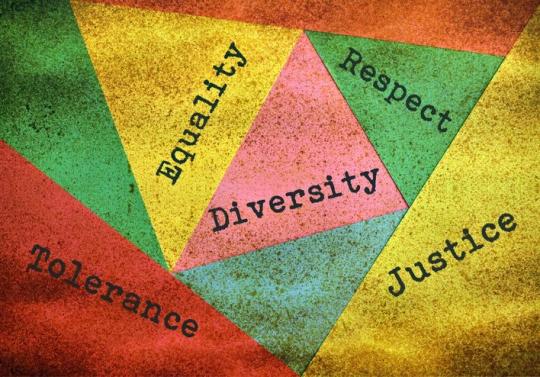
We cannot afford to wallow in our discomfort regarding issues of race and equity. The Southern Poverty Law Center reported an overwhelming 3,265 incidents of hate or bias in schools throughout the nation in the fall of 2018 alone. I, too, have experienced racial trauma at many of the education institutions where I've worked or studied. Educators have an obligation to confront the harm of racism. That is why we must commit to becoming antiracist educators and to preparing our young people to be antiracist, too. I recommend five actions for teaching for an antiracist future.
- Spruill, L. (2016). Slave patrols, ‘packs of Negro dogs’ and policing black communities. Phylon, 53(1), 42-66.
- Stolzenberg, E.B., Eagan, M.K., Zimmerman, H.B., Berdan Lozano, J., Cesar-Davis, N.M., Aragon, M.C., & Rios-Aguilar, C. (2017). Undergraduate teaching faculty: The 2016-2017 HERI Faculty Survey.
This report summarizes the highlights of a national survey of college and university faculty conducted by the Cooperative Institutional Research Program at the Higher Education Research Institute during the 2016–2017 academic year. . . In addition to collecting demographic information, the web-based questionnaire focuses on topics such as how faculty spend their time, how they interact with students, their preferred methods of teaching, their perceptions of institutional climate, their primary sources of stress and satisfaction, and their personal and professional goals.
This paper investigates the most common instructor responses following a tragedy and which of those responses’ students find most helpful. Implications for faculty and faculty developers are discussed.
- The College Fix (2019). UNC protesters accuse campus cops of police brutality in protest that leaves window smashed
- Types of sworn law enforcement. Discover Policing.
- UCLA School of Law Williams Institute. Nonbinary LGBTQ Adults in the United States
Researchers have found that there are key differences between binary and nonbinary identified transgender people that are relevant to understanding health and well-being, such as higher rates of depression but lower rates of mental health care usage among nonbinary people.
- UNC Board of Governors. (2019). Executive summary of the University of North Carolina at Chapel Hill public safety panel report.
- U.S. Department of Education. (2019). The handbook for campus safety and security reporting.
Books and Reading Lists
- Websites and Sources For Free E-Books (Textbooks!)
- 25 Recommended Books on Diversity from Diversity Directions
- GLADD-LGBTQ Resources List
- Cornell University-Student & Campus Life
- Dear America, Notes from an Undocumented Citizen by Jose Antonio Vargas
- North Carolina State-Office for Institutional Equity and Diversity
- Audre Lorde Famous Quotes-Compiled by SSU Office of Diversity, Equity, and Inclusion
- University of Southern California Libraries
Podcasts

- 1619 (The New York Times)
An audio series on how slavery has transformed America, connecting past and present through the oldest form of storytelling.
- Dembe, G. (Host). (2020, March 4). When xenophobia spreads like a virus. [Audio podcast].
Listeners of the National Public Radio podcast discuss whether they had experienced coronavirus-related racism and xenophobia firsthand.
- Brutal Attacks Against Bay Area Asian Americans Spur Calls for Action Statewide on KQED
- Code Switch (NPR)
Hosted by journalists of color, our podcast tackles the subject of race head-on. We explore how it impacts every part of society — from politics and pop culture to history, sports and everything in between.
It’s an election year, and whether people want to admit it or not, race is at the center of every issue -- healthcare, jobs, climate change, the media, and more. Join host Rebecca Carroll for 15 essential conversations about race in a pivotal moment for America. She talks to great thinkers, writers, and artists about faith, representation, white fragility, and how it’s all playing out in 2020.
The Futuro Media Group is an independent nonprofit organization producing multimedia journalism that explores and gives a critical voice to the diversity of the American experience. Based in Harlem and founded in 2010 by award-winning journalist Maria Hinojosa, Futuro Media is committed to telling stories often overlooked by mainstream media.
-
Memories of Japanese-American Internment
In a haunting photo essay for Vogue called “The Memory Keepers,” Bridget Read spoke with women survivors of the Japanese internment, plus their descendants who have become custodians of their family memories. Many of them have deep roots in California agriculture and still work the land. The Good Food podcast is hosted by Evan Kleiman. -
Native America Calling
A live call-in program, linking public radio stations, the Internet, and listeners together into a thought-provoking national conversation about issues specific to Native communities.
Documentary Films
- 13th (Netflix)— Director Ava DuVernay's examination of the U.S. prison system looks at how the country's history of racial inequality drives the high rate of incarceration in America.
- I Am Not Your Negro — A 2016 documentary film directed by Raoul Peck, based on James Baldwin's unfinished manuscript Remember This House. Narrated by actor Samuel L. Jackson, the film explores the history of racism in the United States through Baldwin's reminiscences of civil rights leaders Medgar Evers, Malcolm X, and Martin Luther King Jr., as well as his personal observations of American history.
- The Color of Fear — Insightful, groundbreaking film about the state of race relations in America as seen through the eyes of eight North American men of Asian, European, Latino and African descent
- Anatomy of Hate — The Anatomy of Hate reveals the shared narratives found in hat, and how we as a species can overcome them.
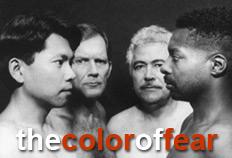
Webinars
Join state policymakers as they discuss the impacts of COVID-19 on African American students, and policy recommendations to support this student population.
In February 2020 AAPF released the “Under the Blacklight” series featuring the intersectional failures that COVID-19 lays bare. The series features educators, and international thinkers discussing how to build coalition and dismantle hierarchy.
Through Q&A’s, seminars, and panel discussions, faculty from a wide range of disciplines share what they know, and what they are learning during the COVID-19 pandemic.
This webinar presents some salient trends and issues that complicate the experiences of diverse community college learners in online courses and propose equity-minded teaching and learning strategies for faculty teaching online courses.
This webinar focuses on how to incorporate equity-mindedness services while teaching remotely. Insight and tips from experts are discussed and strategies are offered to help administrators and staff implement practices and policies.
The National Forum on Black Students, Education, and COVID-19 is sponsored by the USC Race and Equity Center and the UCLA Pritzker Center for Strengthening Children and Families. The forum features a distinguished panel discussing equity for Black students in education.
- Online Education and Website Accessibility, Office of Civil Rights, U.S. Department of Education
The Office for Civil Rights presents this short webinar on online education and website accessibility.
This webinar focuses on strategies that educators can use to address issues of bias and microaggressions in order to meet the needs of historically underrepresented and under-served students in the online environment.
The webinar, Women of Color Need Courageous Allies in the Academy: An Open Dialogue with White and Black Women, featured six panelists — three Black and three White — who represent a variety of perspectives across higher education.
Films
- Influential Asian American and Pacific Islander Movies-May is Asian American & Pacific Islander (AAPI) Heritage Month, to honor the rich history and accomplishments of AAPIs throughout the history of the United States. AARP is proud to celebrate AAPI Heritage month with articles that showcase AAPI accomplishments and culture.
- The Joy Luck Club — A group of Chinese Families immigrant families in San Francisco starts a new club based on the game of Mahjong while feasting on a variety of food called The Joy Luck Club.
- Movies and Documentaries Just Mercy — Based on the life work of civil rights attorney Bryan Stevenson, is one resource we can humbly offer to those who are interested in learning more about the systemic racism that plagues our society.
- The Death and Life of Marsha P. Johnson — Marsha P Johnson was an American gay liberation activist. She was also a key player in the 1969 Stonewall uprising. Though her untimely death was initially ruled a suicide, this documentary sees activist Victoria Cruz try to find justice for her friend.
- The Best of Enemies —The true story of the unlikely relationship between Ann Atwater, an outspoken civil rights activist, and C.P. Ellis, a local Ku Klux Klan leader.
- Green Book — Set in 1962, the film is inspired by the true story of a tour of the Deep South by African American classical and jazz pianist Don Shirley and Italian American bouncer Frank "Tony Lip" Vallelonga who served as Shirley's driver and bodyguard.
- Injustice — Focusing on the struggles for justice by the families of people who have died in police custody, beginning with the British case of David Oluwale in 1969, this film shows the wall of secrecy, bureaucracy and lies the grieving families are met with.
- The Hate U Give —The Hate U Give tells the story of Starr, who witnesses her friend shot dead by police after reaching for his hairbrush. While friends and family from Starr's neighborhood take to the streets to protest, her predominantly white private school friends and boyfriend struggle to understand.
- Selma —As Black residents peacefully march for their rights to vote alongside Martin Luther King Jr. (played by David Oyelowo), police attack and murder the protestors, using both batons and legislation against them. A telling look into the many, many ways Black people are oppressed.
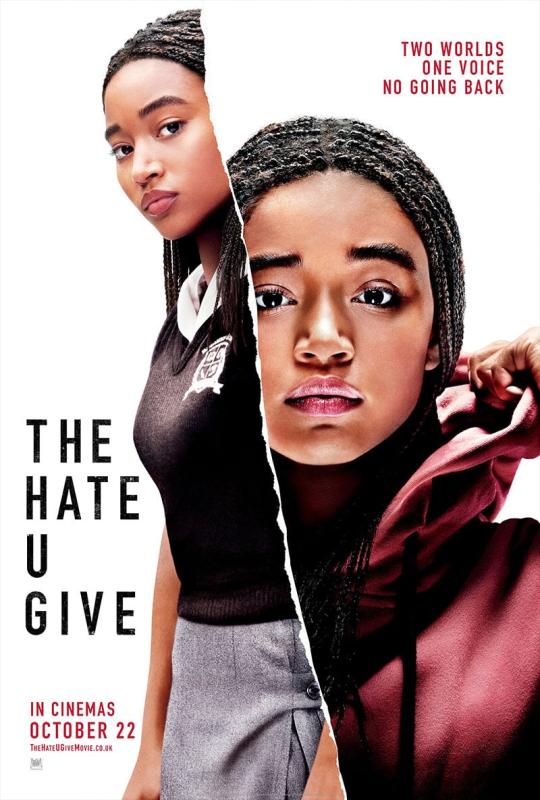
Videos
- Implicit Bias — How it affects us and how we push through — This talk was given at a local TEDx event, produced independently of the TED Conferences. Everyone makes assumptions about people they don’t know. Melanie will teach us to recognize these assumptions and work toward a common understanding.
- Systemic Racism Explained — Systemic racism affects every area of life in the US. From incarceration rates to predatory loans, and trying to solve these problems requires changes in major parts of our system. Here's a closer look at what systemic racism is, and how we can solve it.
- I'm New to Social Justice - This playlist features videos that have feature concepts that are foundational to social justice and the movement to dismantle racism.
- I'm Ready to Dig Deep - This playlist is for folks who have begun their journey as an anti-racist ally but want to dig deeper into the work.
- I Want to Be a Better Ally - The videos in the playlist examine some of the common bumps in the road people experience on their path as an ally and how to overcome them.
- I'm White and I Want to do Better - Are you a white person ready that wants to start your journey as an anti-racist ally but don't know where to start? This playlist is for you.
- Tim Wise: On White Privilege - Wise provides a non-confrontational explanation of white privilege and the damage it does not only to people of color, but to white people as well.
- Nate Boyer on suggesting Colin Kaepernick kneel instead of sit during anthem — Former Army Green Beret and NFL player Nate Boyer joins First Take to discuss the current status of NFL players protesting President Donald Trump after he suggested Colin Kaepernick kneel instead of sit during the national anthem over a year ago.
Related Resources
The 1990 Institute supports educational programming and mobilizes collaborative leadership networks to improve mutual understanding and build a constructive environment for both U.S.-China relations and for Asian Americans.
AAPI Data is a nationally recognized publisher of demographic data and policy research on Asian Americans and Pacific Islanders, with hundreds of news mentions in national and local outlets. Our reputation is built on data and research that is accurate, compelling, and timely. In addition to our news impact, community organizations, government agencies, and decision makers regularly reach out to us, to better understand key aspects of AAPI communities.
Founded in 1996 by Kimberle Crenshaw and Dr. Luke Charles Harris, AAPF is an innovative think tank that connects academics, activists and policy-makers to promote efforts to dismantle structural inequality.
The average white family’s wealth is eight times higher than the wealth of an average Black family, according to the Federal Reserve. Systematic inequality, lack of financial literacy, high default rates on student loans and employment discrimination, among other factors, have led to the racial wealth gap. You can find several tools and resources below to help tackle a few financial challenges and develop ways to create wealth for yourself and your future family.
This page includes selected resources for sharing the facts and examples of how libraries are interrupting not only the spread of misinformation but also related racism and xenophobia.
The map identifies and tracks all anti-Muslim legislation introduced in the US at the state level, as well as provides insight into the divisiveness of the bills, and the role state lawmakers have in institutionalizing Islamophobia. The map and research findings are updated annually at the beginning of each year.
The Asian American Advocacy Fund’s mission is to advocate for the civil and human rights of Asian Americans, Pacific Islanders, and Native Hawaiians in Georgia. Through a combination of policy advocacy at local, state, and federal levels, and by supporting candidates that believe in our values, we fight to create a better Georgia for us all.
Asian Pacific Americans in Higher Education is dedicated to enhancing the educational opportunities for Asian and Pacific American students; promoting and supporting the hiring, retention, and advancement of qualified Asian and Pacific American faculty, staff, and administrators; and creating a better understanding of issues in the public affecting Asian and Pacific Americans in higher education
The mission of the Antiracist Research & Policy Center (ARPC) is to support the innovation and enactment of antiracist policies at the local, state and national level by connecting AU faculty, students, and staff to the Washington, DC, and wider communities.
- Asian Pacific American Institute for Congressional Studies
The Asian Pacific American Institute for Congressional Studies (APAICS) is a national non-partisan, nonprofit 501(c)(3) organization dedicated to promoting Asian Pacific American participation and representation at all levels of the political process, from community service to elected office. APAICS programs focus on developing leadership, building public policy knowledge, and filling the political pipeline for Asian Pacific Americans to pursue public office at the local, state, and federal levels.
- Asian Pacific American Smithsonian
"The Smithsonian Asian Pacific American Center’s observance of Asian American and Pacific Islander Heritage Month in May focuses on combating xenophobia together with diverse thought leaders to bridge communities in dialogue. Please visit this page regularly to access these upcoming resources in May and beyond."
Asian Americans are an incredibly diverse minority group. As such, they happen to have the most significant rates of income inequality, with the top 10% earners making nearly 11 times that of the bottom 10%. That’s why we published a brand-new guide that addresses financial challenges and contributes expert-driven solutions to provide financial education and support to this multifarious community.
In the aftermath of the recent increase in hate crimes and bias incidents against Asian Americans and Pacific Islanders, many communities are showing their support in various ways, from social media activism to mutual aid efforts. To address the needs of current and future students, our educators at BestColleges.com curated the ultimate resource guide. Take a look below:
"We encourage all who have witnessed or experienced micro-aggressions, bullying, harassment, hate speech, or violence to help us document. The more information we have, the better we can respond and prevent further incidents from occurring."
Founded by Ibram X. Kendi, the mission of the Boston University Center for Antiracist Research is to convene researchers and practitioners from various disciplines to figure out novel and practical ways to understand, explain, and solve seemingly intractable problems of racial inequity and injustice.
- Balancing Diversity and Free Expression in Higher Education: Diversity Officers' Experiences
- Black Administrators and Black Student Activism: Social Media's Impact on Navigating Relationships and Transforming Learning
- Boondock or Bust
- California Indian Museum and Cultural Center
The purpose of the California Indian Museum and Cultural Center is to culturally enrich and benefit the people of California and the general public. The goals of the Museum and Cultural Center are to educate the public about California Indian history and cultures, to showcase California Indian cultures, to enhance and facilitate these cultures and traditions through educational and cultural activities, to preserve and protect California Indian cultural and intellectual properties, and to develop relationships with other indigenous groups.
- Cohen, Jenae and Beth Seltzer. 2020. “Teaching Effectively During Times of Disruption." Stanford University online resource.
This guide was prepared for faculty teaching remotely during times of crisis. It offers advice, lessons, and strategy to make your classroom as effective for learning.
This guide provides resources and a list of scholarships that international students can use to fund their college education in the US.
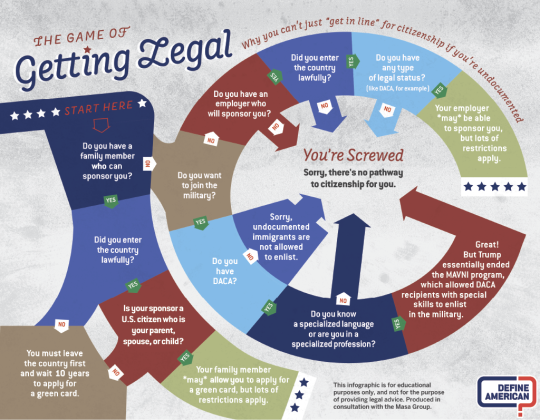
Long Description for The Game of Getting Legal
Define American is a narrative and culture change organization that uses media and the power of storytelling to transcend politics and shift the conversation about immigrants, identity, and citizenship in a changing America.
"Our mission at the Greater Good Science Center is to elevate the human potential for compassion. But that does not mean we deny or dismiss the human potential for violence, particularly toward marginalized or dehumanized groups."
The Hispanic Association of Colleges and Universities (HACU) was established in 1986 with a founding membership of eighteen institutions. Because of HACU’s exemplary leadership on behalf of the nation’s youngest and fastest-growing population, the Association rapidly grew in numbers and national impact.
HSF empowers families with the knowledge and resources to successfully complete a higher education, while providing scholarships and support services to as many exceptional students as possible.
The effects of these disparities appear in the demographics of rental and homeownership rates in many areas. While the homeownership rate among Hispanics increased by 47.5% since 2019, many younger Latinos find that their path to homeownership and financial security are hindered by monthly student loan repayments, which in turn prevents many of them from being able to build up their savings.
- If You Can Pronounce Daenerys Targaryen, Then You Can Learn To Say My Latin American Name
- Aizita Magana, Huff Post, September 2022
- Aizita Magana, Huff Post, September 2022
- Immigration History - Where did our current immigration laws come from?
- Inclusive Excellence Leadership Academy, COVID-19 DEI Strategy Center
The Academy is dedicated to helping participants boost their strategic diversity leadership skills, disrupt the status quo at their institutions, and become innovative game changers around issues of diversity, equity, and inclusion.
INSIGHT Into Diversity is the oldest and largest diversity magazine and website in higher education today. For over 45 years, INSIGHT Into Diversity has connected potential employees with institutions and businesses choosing to embrace a workforce more reflective of our local and national communities.
- Inside Higher Education April 29, 2021- Don’t Mistake Training for Education
- Inside Higher Ed - Addressing the Mental Health of LGBTQ + Students
- Iowa State University (Read and Learn Library Guide)
This website offers resources on how to address COVID-19 racism and microaggressions using facts. A variety of tools and resources are provided for higher education professionals.
Introducing a Web-Based Index plus Three Essays on Best Practices in Latino Education in the United States
Find your next great opportunity in higher education
- LGBTQ + Inclusive Language - Do's and Don'ts
- LGBTQ+ Resources and Handouts - Safe Zone Project
- Moving Beyond Bias - Implicit Bias is a Habit of the Mind
- Navigating Covid-19 and racial violence
"The National Equity Project is a leadership and systems change organization committed to increasing the capacity of people to achieve thriving, self-determining, educated, and just communities. Our mission is to transform the experiences, outcomes, and life options for children and families who have been historically underserved by our institutions and systems."
Our systematic approach to anti-bias, social justice and civil rights education makes complex topics easier to understand—and teach.
Our Mission: Serving immediate needs. Supporting long-term solutions. Our Vision: Strong, self-sufficient Native American communities.
- Othering & Belonging Institute at UC Berkeley
The Othering & Belonging Institute at UC Berkeley brings together researchers, organizers, stakeholders, communicators, and policymakers to identify and eliminate the barriers to an inclusive, just, and sustainable society in order to create transformative change. - SingleCare
- SSU Career Center Diversity, Equity and Inclusion Resource List
- SSU Erna and Arthur Salm Holocaust & Genocide Memorial
The Holocaust & Genocide Memorial Grove at Sonoma State University is designed to honor survivors and victims of the genocides committed throughout the world, including the Native American Genocide, the Armenian Genocide, the Jewish Holocaust, the Cambodian Genocide, the Rwandan Genocide, and the current-day genocide in Darfur. Another aim of the monument is to recognize educators, scholars and activists working for awareness, tolerance and human rights across the globe.
This guide provides access to a selected list of resources pertaining to LGBTQ+ (Lesbian, Gay, Bisexual, Transgender, Questioning/Queer plus) issues and interests.
The number of hate incidents reported to our center represent only a fraction of the number of hate incidents that actually occur, but it does show how vulnerable Asian Americans are to discrimination, and the types of discrimination they face.
Search SPLC publications, cases, Extremist Files, Intelligence Project articles, and more.
In this guide, you’ll find state and national helplines, shelters and other organizations that can help, along with tips for how to avoid homelessness. If you are among the LGBTQ+ homeless youth in America, these resources can help you find support and a safe home.
The purpose of Teach Mideast is to provide free and accessible, high-quality information and resources to enable K-14 educators to teach about the Middle East in social studies and introductory area studies classes. We aim to do this through presentations and workshops for students, educators, and other civic leaders. Our core tool is this website, which uses digital media resources to reach users in a globally-connected society. Working in conjunction with Title VI university outreach centers, scholars, area specialists, and teachers themselves, Teach Mideast provides tools and support to better inform students about the Middle East and Muslim world today so they are adequately equipped to handle difficult policy decisions in the future.
This website is neither comprehensive nor incontrovertible, but it’s an ever-improving list of definitions for terminology relating to LGBTQ+ identities & people, sexualities, and genders.
A framework to develop and strengthen mental health support for LGBTQ+ students across the country.
GLAAD rewrites the script for LGBTQ acceptance. As a dynamic media force, GLAAD tackles tough issues to shape the narrative and provoke dialogue that leads to cultural change. GLAAD protects all that has been accomplished and creates a world where everyone can live the life they love.
The USC Race and Equity Center is a dynamic research and organizational improvement center that helps professionals in educational institutions, corporations, and other contexts strategically develop and achieve equity goals, better understand and correct climate problems, avoid and recover from racial crises, and engineer sustainable cultures of inclusion and respect.
We’ve collected the CUE tools from across the phases for easy access. We’ve also included additional tools below focused on policy and STEM—please explore!
EAB’s analysis examined how institutions are using the national moment to identify structural and cultural racism on their campuses, the level and type of commitments leaders made to address racism, and how institutions are ensuring that their commitments will be effective in developing an anti-racist campus culture.
This guide was created to introduce disabled workers and job-seekers to the rights afforded to them by federal and state governments. In addition, we offer useful tips for finding a job, advice on staying gainfully employed, and guidance that can help you talk with an existing employer about making reasonable accommodation for you.
Careers in STEM are still severely lacking representation of women and minorities. Dominating the field, 67% of STEM workers are white. It is evident that more diversity is needed throughout the computer science field.


